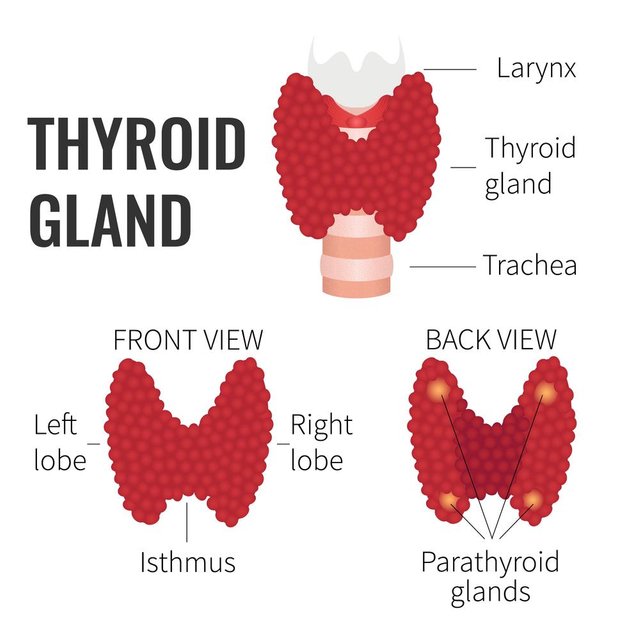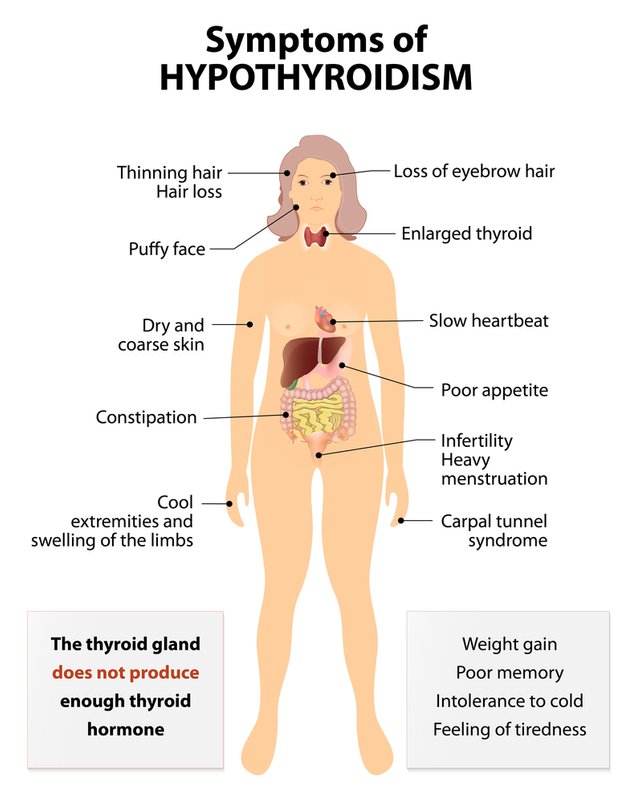Slow thyroid (hypothyroidism): treatment + symptoms

The thyroid is a throat in your throat that produces hormones and secretes into your blood. Through the blood circulation thyroid hormones come to the cells of your organs and tissues.

T4 : thyroxine
T3 : triiodothyronine
If thyroid gland does not produce T3 and T4, it is also called a slow thyroid, slow-working thyroid or hypothyroidism. In this article you will read everything about a delayed thyroid effect ...
Synonyms of hypothyroidism

- Hypothyroidism / hypothyroidism
- Thyroid deficiency
- (Te) slow / slow thyroid gland
- Poorly functioning thyroid
- Underactive / inactive thyroid gland
- (Tea) slow / slow-acting thyroid gland
- Slow or low thyroid gland
- Delayed or lazy thyroid
- (Te) slow functioning of thyroid gland
- Low thyroid hormone
- Thyroid- " hypo " or hypofunction
If thyroid gland is insufficient, insufficient thyroid hormones are created and the level in your blood is therefore too low.
Slow thyroid gland = few thyroid hormones
Thyroid hormones cover - directly or indirectly - a crucial function within virtually all cells, tissues and organs. Heart, muscles, brain, gastrointestinal tract, skin and so on.

- Metabolism ( metabolism )
- Nervous system (body control)
- Physical growth & recovery
- Heart rate & heart rate
- Moisture & Fatigue
- Function of muscles & joints
- Thinking process & feeling
- Digestion ( digestion )
- Body temperature
Without thyroid hormones you can not live. A small deficiency of thyroid hormones even causes health problems.
Symptoms of a slow thyroid gland
A too slow thyroid gland causes a variety of symptoms and complaints that are mild and getting worse at the beginning.

- Extremely tired & lustless
- Dizzy & light in the head
- Low body temperature (35 - 36.6 ° C)
- Lethargic : long sleep and sleepy during the daytime
- Swollen thyroid gland ( struma )
- Menstrual complaints
- Extremely cold (shivering and shattering)
- Apathetic : Do not burn in advance
- Cold hands and feet + tingling in extremities
- Hair loss + dry, shine free & fragile hair
- Hold a lot of moisture (edema)
- " Puffy " face ( myxoidema )
- Pulling eyes & hanging eyelids
- Nails are weak, brittle & ribbed
- (Exacerbation of) eye complaints
- Skin is dry, cleaved, flaky & flaky
- Vitiligo ( pigmentation of the skin)
- Memory & Concentration Problems
- Upset stomach and intestinal obstruction
- Growth decline in children
- Low blood pressure
- Heart rhythm disturbance (palpitations, extrasystoles, etc.)
- Slow heart rate ( bradycardia )
- Muscle pain & muscle cramp (chronic)
- Strongly reduced appetite
- Emotionally unstable & melancholic
- Depression & burnout
- Inexplicable weight gain
The above symptoms of hypothyroidism do not necessarily have to occur at all times or at all (at the same time).
Forms of hypothyroidism
There are several forms of hypothyroidism. We distinguish between the following appearances of a thyroid gland:
1. Subclinical hypothyroidism
In the case of subclinical hypothyroidism, the thyroid gland is too slow, but no apparent complaints occur. The slow thyroid can remain subclinical but also be a precursor of the clinical variant. As long as hypothyroidism remains sub-clinical, the lack of thyroid hormones need not be artificially supplemented.
2. Clinical hypothyroidism
In clinical hypothyroidism, there are also noticeable and / or measurable complaints. Treatment of the delayed thyroid gland is therefore necessary to increase the hormone level. Clinical hypothyroidism may have a primary, secondary or tertiary cause ...
3. Primary hypothyroidism
In primary or central hypothyroidism, the thyroid gland can not generate enough thyroid hormones to cause complaints. Primary implies that the cause is found in the thyroid gland. The thyroid itself is thus responsible for the inadequate hormone release.
4. Secondary hypothyroidism
The brain attachment (pituitary gland) produces TSH, a hormone that stimulates the thyroid and thus regulates thyroid hormone release. In secondary hypothyroidism, the thyroid gland causes too few hormones due to disturbed pituitary gland. This causes clinical complaints.
5. Tertiary hypothyroidism
The brains (thalamus & hypothalamus) regulate the TSH release by the pituitary gland. In rare cases, thyroid gland causes too little thyroid hormones due to a defect of the hypothalamus. In that case we speak of tertiary hypothyroidism.
6. Congenital hypothyroidism
Congenital hypothyroidism (CHT) refers to a congenital deficiency of thyroid hormones that you receive with your birth. The deficiency is caused by an undeveloped or underdeveloped thyroid gland. The baby is thus born without - or with an inferior - thyroid gland. Congenital hypothyroidism is always primary & clinical.
7. Endemic hypothyroidism
Endemic "hypo" refers to a delayed thyroid gland due to lack of trace element iodine. Iodine is a crucial component of thyroid hormones, so without iodine, a reduced thyroid hormone release will automatically occur.
8. Iatrogen-induced hypothyroidism
'Iatrogen induced' means that something is caused by medication. In this case, the slow-acting thyroid gland is caused by medication. Iatrogenic hypothyroidism is usually lithium-induced ... or resulting from an overdose of thyrostatic agents (thyroid glanders).
A slow thyroid gland is determined by blood screening. The thyroid hormones, TSH values and blood antibodies are measured.
Causes of a too slow thyroid gland
Hypothyroidism can be caused by a variety of conditions, disorders, drugs and nutrient deficiencies. The best known causes of a delayed thyroid gland are as follows:
- Thyroiditis ( thyroiditis )
- Disease Hashimoto's (autoimmune disease)
- Lack of certain nutrients (iodine, etc.)
- Graves disease (advanced stage)
- " Benign " swollen thyroid (nodus, cystea)
- Treatment with radioactive iodine ( RAJ )
- Birth defect (congenital)
- Complete or partial thyroid removal
- Thyroid cancer (malignant tumor)
- Radioactive radiation of the neck area
- Adrenal dysfunction
An unhealthy lifestyle may also worsen thyroid gland (directly or indirectly). This may include inadequate and / or irregular sleep, inadequate sleep quality, excessive mental stress , unilateral and unhealthy eating and insufficient physical activity.
The treatment of a slow thyroid or deficiency of thyroid hormones is strongly dependent on the underlying cause.
Treatment of a slow thyroid gland
If a slow thyroid causes hypothyroidism, treatment is required. Treating a slow-acting thyroid gland can occur in three ways, namely:
1. Extra iodine against slow thyroid gland
If a slow-acting thyroid gland is caused by a lack of iodine, it may suffice to increase iodine intake. In addition, a severe iodine deficiency is unlikely in the Netherlands.
2. Swallow thyroid hormones
In most cases of a slow-acting thyroid gland, tablets with synthetic thyroid hormones or thyromimetics should be taken. Typically, synthetic T4 (levothyroxine) is administered. This agent is sold as Thyrax®, Euthyrox® and Eltroxin®.
In some cases, synthetic T3 (liothyronin) is prescribed. This agent is available as: Cynomel®, Cytomel® & Thybon®. The slower the thyroid, the more hormones there should be slaughtered. In the absence of a thyroid gland, full hormone production should be collected with artificial thyroid hormones.
3. Operation in slow thyroid gland
If the thyroid gland is counteracted by a "benign" cyst or nodule, thyroid surgery may be necessary. In certain cases, it may be preferable to be allowed to sit down and treat treatment with thyroid hormones to support the slow-acting thyroid gland.
In case of an underlying cause such as an inflammation, swelling or pituitary abnormality, the attacker should of course be treated.

Finally
A slow thyroid gland must be supported for long periods by artificial thyroid hormones in the vast majority of cases. Clinical hypothyroidism is therefore important, but with the right medication, it is not necessary to give any complaints.
Do you have a slow-working thyroid gland? Share your experiences and stories about a too slow thyroid in a comment below...
Sources:
Link #1
Link #2
Link #3
Link #4
Thanks for reading, I hope you liked it!

Steem's Popularity Is Incredible!
Share the joy by inviting others!
Get More Exposure On The Chats!
It is a best way to get more exposure through private messages and in the chat rooms. These are some of the best places to get more exposure & makes Steem friends.
- Official Steemit.chat
- SteemSpeak.com @fyrstikken (24/7 Voice chat)
- Peace, Abundance, Liberty @aggroed @canadian-coconut @ausbitbank @teamsteem and More (Minnow Support Project)
For new & best authors to move forward!
http://curiesteem.com @curie
https://steemvoter.com @steemvoter @thecryptodrive @cryptomancer
My Latest Posts:
- The box with insight, human knowledge & dilemmas... Funny STORY!!
- 💖💗💘💕 LOVE talks and funny sayings about love 💕💘💗💖
- Super Mario Odyssey Preview - The trip of your life
- Bitcoin Bubble 2018 Crypto Currency Crash
- Pain between shoulders or shoulder blades: causes & solutions
- NBA 2K18 Review - Forget Pastor
- The story of you and me. Relationships are complex, illogical and inexplicable
- Dental problems: treatment, symptoms & causes
- Project CARS 2 Review - Digital Racing at its best
- In what dream do you live if you live in fear?


This post recieved an upvote from minnowpond. If you would like to recieve upvotes from minnowpond on all your posts, simply FOLLOW @minnowpond
This is great! @braini
Congratulations! This post has been upvoted from the communal account, @minnowsupport, by braini from the Minnow Support Project. It's a witness project run by aggroed, ausbitbank, teamsteem, theprophet0, someguy123, neoxian, followbtcnews/crimsonclad, and netuoso. The goal is to help Steemit grow by supporting Minnows and creating a social network. Please find us in the Peace, Abundance, and Liberty Network (PALnet) Discord Channel. It's a completely public and open space to all members of the Steemit community who voluntarily choose to be there.